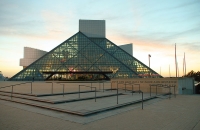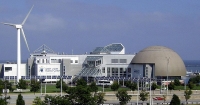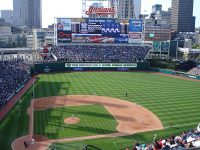City guides


Cleveland Travel Guide
Founded in 1796, Cleveland became an industrial town with the opening of the Erie-Ohio Canal that linked the Ohio River to Lake Erie, and the city's vast iron and coal supplies made it one of the most important steel and shipbuilding centres in the country.
A sprawling mass of oil refineries, mills, and warehouses along the shores of Lake Erie, industrial success poured money into the city and wealthy tycoons built the downtown area. Today, it has outgrown its 'steel town' image and is a bustling city of green parklands and vibrant atmosphere.
Previously mocked for its heavy pollution, its industrial character has moved beyond the city limits. The downtown warehouses and factories now house trendy clubs and restaurants, while museums, and sporting and cultural events attract many visitors to the city.
The city boasts a world-class orchestra, a celebrated art museum, lively theatre district, and the restored lakefront area. Neighbourhoods buzz with restaurants and shops, and the Flats, once the industrial heart of the city, is now the booming entertainment and nightlife district of Cleveland.
Other cultural attractions in Cleveland include the Rock and Roll Hall of Fame and Museum, the enormous Great Lakes Science Center and Cleveland Clinic DOME Theatre, and the professional sports arenas and stadiums of the Gateway District.
The historic Warehouse District is downtown's oldest commercial quarter and is a National Historic Landmark, with over 70 fine examples of Victorian architecture. The old warehouses are now home to music clubs, galleries and trendy dining spots.
Some miles out of the city centre are two theme parks with some of the planet's tallest and fastest rollercoaster rides at the Cedar Point Amusement Park in Sandusky, as well as the Six Flags Worlds of Adventure in Aurora.
Visitors who are in town over the summer can enjoy the Taste of Summer culinary festival, which celebrates cultural and ethnic diversity, and the Irish Cultural Festival, which offers, among other things, dancing, world-class music, theatre and art exhibits.
Things to do in Cleveland
Cleveland is a huge city with plenty to see and do. Most tourists spend their time in the downtown area, which is home to top attractions such as the Rock and Roll Hall of Fame, Progressive Field, the Greater Cleveland Aquarium, and Jack Cleveland Casino.
Terminal Tower, the centre point of the Tower City Center, has an observation deck that allows panoramic views of the city. For art galleries and museums, Cleveland's East Side is home to the Cleveland Museum of Art, the Western Reserve Historical Society, The Children's Museum, and the Cleveland Museum of Natural History.
The East Side is also home to the Cleveland Botanical Garden, while the Cleveland Metroparks Zoo is located on the West Side. Families in Cleveland will not want to pass up the chance to visit Cedar Point Amusement Park, among the largest in the country and located just an hour outside of the city.

Rock and Roll Hall of Fame
Cleveland DJ Alan Freed coined the term 'rock and roll' in the early 1950s. Partly for this reason, Cleveland won the fiercely contested honour of become home to the Rock and Roll Hall of Fame and Museum. Designed by renowned architect I.M. Pei, it is meant to be seen as an echo of the energy of rock and roll. The glass and porcelain pyramid-shaped structure is a celebration of the American institution of rock music in honour of those who have had an influential role on modern music. There is a permanent collection drawing from the most impressive and iconic rock and roll artefacts, as well as a wide-ranging roster of ongoing and temporary exhibits. The Rock and Roll Hall of Fame and Museum is dedicated to exploring the past, present, and future of the music. The Museum augments its own massive collection of thousands of artefacts with items on loan from artists and collectors from around the world. It includes exhibits dedicated to the museum's choice of all-time top artists, including Elvis Presley, the Beatles, U2 and the Rolling Stones.

Great Lakes Science Center
The Great Lakes Science Center is one of the largest science museums in the country. Located on the lakefront, its glass facade makes it a perfect match to the adjacent glass pyramid-shaped structure of the Rock and Roll Hall of Fame. It has 375 exciting interactive exhibits, explaining subjects such as planet earth, meteorology, sports, music, environment, and technology through hands-on examples. It also contains the region's only OMNIMAX Theatre. The attraction is closed on Thanksgiving and Christmas Day.
Cedar Point Amusement Park
Cedar Point Amusement Park, located in Sandusky Ohio just outside of Cleveland, is a paradise for rollercoaster lovers. Named 'Best Amusement Park in the World' many times over, it is the only park to have five rollercoasters taller than 200 feet (61m). It is the only amusement park of its size within hundreds of miles. If those are too high, there are 13 others to choose from, along with dozens of other rides and attractions for all ages. Cedar Point also boasts an indoor and outdoor waterpark.

Progressive Field
Though synonymous with the notorious Cleveland sports curse that saw none of the city's professional teams win a championship for 52 years, Progressive Field is a must stop for anyone who wants to appreciate this sports-crazy destination. Home to the Cleveland Indians baseball team, this beautiful outdoor stadium in downtown Cleveland was voted the best major league ballpark by Sports Illustrated. Catching an Indians game is a great way to spend a warm summer evening in Cleveland, and true fanatics can take a tour of the stadium between May and September.
Getting Around
The layout of the city is an easily navigable grid pattern, meaning that hiring a car will be a simple way to get around Cleveland. The city is served by the Regional Transit Authority (RTA), a bus and rail system that offers good service around the city, although coverage in outlying areas is sparse.
Tourists will want to take advantage of the Bus Rapid Transit's HealthLine, which runs along Euclid Avenue and connects many of Cleveland's popular tourist attractions. Taxis are expensive and must be booked in advance by phone. Ride-hailing apps are also available.
Cleveland Climate and Weather
The weather in Cleveland follows the Midwest seasonal pattern, but is modified quite strongly by Lake Erie, which counters the worst of the summer heat waves and makes for a milder winter season than in other northern cities. Summers (June to August) are warm and humid, with average temperatures between 60F (16C) and 82F (28C). Winters (December to January) are cold and snowy, averaging between 21°F (-6C) and 38°F (3C). Rainfall in Cleveland is moderate and constant throughout the year.
United States of America travel info
Electricity
The electrical current is 120 volts, 60Hz. Plugs are mainly the type with two flat pins, though three-pin plugs (two flat parallel pins and a rounded pin) are also widely used. European appliances without dual-voltage capabilities will require an adapter.
Language
English is the most common language spoken but Spanish is often heard in the south-western states.
Money
The official currency is the US Dollar (USD), which is divided into 100 cents. Only major banks exchange foreign currency. ATMs are widespread and credit cards are widely accepted; Apple Pay and Google Pay are very popular. Banking hours are Monday to Friday 9am to 3pm.
Tipping
A 15 percent tip is expected by taxi drivers, bartenders, hairdressers and waiters, but travellers shouldn't tip in fast-food or self-service restaurants. In expensive restaurants or for large parties, the tip should be 20 percent of the bill. It's normal to tip staff such as valets and porters in hotels; this is discretionary, although a minimum of $5 is expected. Most services are customarily tipped if the service is good.
Health
There are no specific health risks associated with travel within the USA. Medical facilities are excellent, but expensive. Only emergencies are treated without prior payment and treatment can be refused without evidence of insurance or proof of funds. Good medical insurance is essential.
Safety
Travel within the United States is generally trouble-free, though travellers should be aware that the US shares with the rest of the world an increased threat from terrorist incidents. Security has been heightened, particularly at airports. Restrictions on hand luggage apply and travellers are advised to check on the latest situation with airlines in advance. Travellers should also be alert to the dangers of car and street crime in cities and should use common sense and take basic precautions. Hurricanes are common between June and November, putting the southern USA, including the Gulf Coast and the eastern US at risk. There's a risk of wildfires in many dry areas in the US, particularly on the West Coast from March to November.
Local customs
Laws vary from state to state, including speed limit, fines and punishment. The age at which alcohol may be legally bought and consumed is 21 years.
Doing business
In such a large country, filled with so many diverse groups, business practices may differ according to each state, though rarely to any large degree. The East Coast is traditionally more formal than the West Coast, though in states such as California, dress code and conservative appearance are as common as they would be in New York. Punctuality is important throughout the country and it's considered rude to be late for a meeting. Gift-giving is uncommon as it may be construed as bribery. Appropriate titles (Mr, Mrs, Ms) are used upon introduction and until otherwise stated. Americans favour politeness and greetings of 'Hello' and 'How are you?' are often expressed with sincerity. Business hours may vary in each state, but an 8am start and 5pm finish Monday to Friday is the most common with an hour over lunch.
Status and age are not necessarily indicative of seniority, nor do they carry much weight in themselves. Those doing business in the States should be mindful of this fact; foreigners should never make assumptions about someone's position or rank. Best practice is to be respectful to all parties. That said, the US upholds a hierarchal business structure in which 'the boss' is the ultimate decision-maker. Senior leaders have the power of the last word, and can go against the grain just as easily as they can follow popular opinion. Foreigners should concentrate on winning over this individual, even if the greater group seems unsupportive. Americans value a direct style of communication. In this fast-paced, consumer culture 'time is money', and small-talk is viewed as unnecessary and wasteful. It's best for foreigners to get to the point quickly, speak about issues in a frank and open manner, and to avoid taking offence if someone questions or challenges them outright.
Duty free
Travellers to the United States who are returning residents of the country do not have to pay duty on articles purchased abroad to the value of $800 provided their stay was longer than 48 hours and their duty-free allowance was not used in the 30-day period prior. For passengers arriving from Samoa, Guam and the U.S. Virgin Islands, a duty-free allowance of $1,600 is allowed. The following items are included in this: 50 cigarettes and 10 cigars and 150 millilitres (5 fl. oz.) of alcoholic beverages or 150 millilitres (5 fl. oz.) of perfume containing alcohol. Restrictions may apply to goods from Cuba, Iran, North Korea, Burma (Myanmar), Angola, Liberia and Sudan. It is prohibited to import Cuban cigars from any country.
Travellers to the United States who are non-residents do not have to pay duty on the following items: 50 cigars or 200 cigarettes and gifts to the value of $100 provided their stay in the USA is not less than 72 hours and that the allowance has not been used in the preceding six-month period.
Prohibited items for residents and non-residents include meat or meat products, poultry, narcotics, absinthe, plants, seeds, vegetables, fruits, soil, live insects and other living plants or animal pests. Fish is prohibited unless it carries disease-free certification. Wildlife and animals or their by-products carry restrictions. Dairy products and eggs from specified countries are not allowed. Firearms and ammunition are not allowed without the necessary license and permit.
Communications
The international country dialling code for the United States is +1. Mobile networks cover most of the country, especially all urban areas; travellers can purchase local prepaid SIM cards for unlocked phones or use eSIMs if their cellular providers support it on their networks. WiFi is widely available.
Passport & Visa
It is highly recommended that travellers' passports have at least six months' validity remaining after the intended date of departure from them travel destination. A visa is required for short visits unless travellers qualify for entry under the Visa Waiver Program.
The Visa Waiver Program (VWP) enables citizens of certain countries to travel to the US for a stay of up to 90 days without a visa. Visitors under the VWP need a valid Electronic System for Travel Authorization (ESTA), which allows the US government to screen all visitors before travel. Visitors entering the country under the VWP must have a machine-readable passport (MRP) that has a barcode on the photo page. Travellers under the VWP must have passports that include biometrics if they wish to enter the country without a visa, which means that passports must contain unique personal data such as fingerprints or iris details. All passports must contain a digital photo image in order to travel visa-free. All visitors to the USA have a photograph and two fingerprints taken by an inkless scanner on arrival, including those travelling visa-free under the VWP.
As part of the Western Hemisphere Travel Initiative (WHTI), all travellers travelling between the United States and Canada, Mexico, Bermuda, and the Caribbean region are required to present a passport or other valid travel document to enter or re-enter the United States. If departing from the USA, a valid passport is required by immigration authorities. Immigration officials often apply different rules to those stated by travel agents and official sources.
Entry requirements
US citizens require passports.
UK nationals require a passport valid for duration of stay. Most passport holders can get an Electronic System for Travel Authorisation (ESTA) through the Visa Waiver Programme, which allows travel to the US for up to 90 days. The VWP includes tourism, certain types of business visit and transit to another country.
The most important requirement on entering the U.S. is providing proof of Canadian citizenship. A valid Canadian passport is the best document to prove Canadian citizenship and the right to return to Canada. However, several other documents can serve, depending on the mode of transport. Generally, Canadian citizens do not require visitor, business, transit or other visas to enter the United States from Canada, though there are some exceptions.
Passports must be valid for the period of intended stay. If visiting the US for fewer than 90 days, Australian nationals may be eligible to apply for an Electronic System for Travel Authorization (ESTA), and enter under the Visa Waiver Program (VWP).
South Africans must hold a passport valid for duration of stay. A visa is required.
Passports must be valid for duration of stay. Irish nationals can get an Electronic System for Travel Authorisation (ESTA) under the Visa Waiver Programme for entry into the United States.
Passports must be valid for duration of stay. New Zealand nationals can get an Electronic System for Travel Authorisation (ESTA) under the Visa Waiver Programme for entry into the United States.
Useful contacts
United States Tourist Office: www.usatourist.com
911 (General)Embassies / consulates in other countries
United States Embassy, London, United Kingdom: +44 20 7499 9000.
United States Embassy, Ottawa, Canada: +1 613 688 5335.
United States Embassy, Canberra, Australia: +61 2 6214 5600.
United States Embassy, Pretoria, South Africa: +27 12 431 4000.
United States Embassy, Dublin, Ireland: +353 1 668 8777.
United States Embassy, Wellington, New Zealand: +64 4 462 6000.
Embassies / consulates in United States of America
British Embassy, Washington DC: +1 202 588 6500.
Canadian Embassy, Washington DC: +1 202 682 1740.
Australian Embassy, Washington DC: +1 202 797 3000.
South African Embassy, Washington DC: +1 202 232 4400.
Irish Embassy, Washington DC: +1 202 462 3939.
New Zealand Embassy, Washington DC: +1 202 328 4800.


